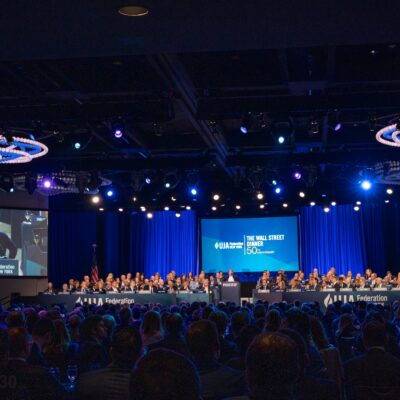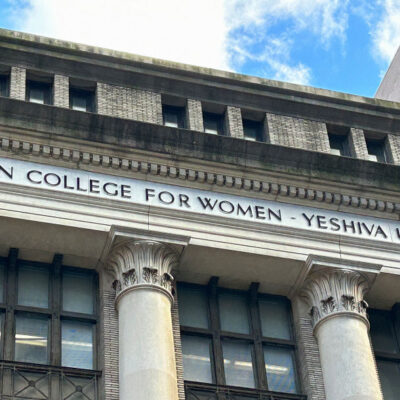Your Daily Phil: A ‘Shark Tank’ for Jewish students + The spike in U.S. aliyah
Good Tuesday morning!
A smart tampon. A safer bicycle helmet. A better way to sort prescriptions.
Those were some of the 400 inventions proposed by nearly 1,000 students from Jewish high schools who gathered in a mega-mall in New Jersey’s Meadowlands on Monday for Innovation Day 2022, a competition modeled on “Shark Tank,” the popular reality show where entrepreneurs compete for funding from wealthy celebrities.
The event at the American Dream mall was hosted by the Center for Initiatives in Jewish Education (CIJE), which encourages STEM learning in Jewish day schools, and drew in students from 42 schools in the tristate area and beyond. Over the course of the day, students were judged by a panel of adults as well as their peers on criteria including the quality of their construction, coding, presentation and the idea itself. There was a range of awards for categories such as “Elegant Design,” “Best Engineering for Transportation” and “Best Judaic Invention.”
First prize in Engineering for Children went to the Smart Helmet, designed by Erez Fass, Noah Doft and Isaac Reicin of the Bi-Cultural Hebrew Academy in Connecticut. The helmet aims to monitor the location and safety of kids on bicycles. Best Engineering for Personal Care went to the Digital Overflow Tracking Tampon, or DOTT, invented by Riki Kaminer and Tara Koplowitz of Bruriah High School for Girls in Elizabeth, N.J. The DOTT looks to bring tampon technology into the 21st century by tracking overflow.
Third place in Engineering for Children went to the Hug-A-Bear, a robotic bear designed to support people experiencing anxiety. According to Adam Jerozolim, CIJE’s director of curriculum development, the engineering team — Miri Firestone, Ayelet Friedman, Maya Grove and Yael Schapiro from Bais Yaakov of Baltimore School For Girls — may have won a more valuable prize. Jerozolim said one of the adult judges, who lives and works near Bais Yaakov, is interested in bringing the Hug-A-Bear to market.
Some other winners may also have a chance to see their product sold. In several months, CIJE will announce a group of about half a dozen “CIJE Tank” finalists from Monday’s competition as well as similar ones in Florida and Illinois that draw a nationwide total of some 1,800 high school students. The finalists will present revised products to a panel of entrepreneurs in early 2023, and CIJE will help the winners patent their invention and try to bring the product to market.
When they weren’t presenting, the teens could enjoy the mall, whose features include a theme park and waterpark. And some attendees were grateful not to have to make use of technology.
“It feels amazing to see everyone and to see everyone’s project,” Andres Pabon, a STEM teacher from the Stella K. Abraham High School for Girls on Long Island, told eJewishPhilanthropy, “and not to be in a box on a screen.”
leaving on a jet plane
Aliyah from the U.S. spiked last year. Now, Nefesh B’Nefesh wants to keep the trend going

NAGA MALASA
While would-be tourists to Israel faced a seemingly unending stream of obstacles over the pandemic’s first two years, one group of travelers to the Jewish state grew larger in 2021 — those who were coming to stay. That was one of the takeaways from a briefing on Monday by Israeli Immigration and Absorption Minister Pnina Tamano-Shata and Nefesh B’Nefesh (NBN), which promotes and facilitates North American Jewish immigration to Israel, reports eJewishPhilanthropy’s Ben Sales.
Rising numbers: For at least the past decade, North American aliyah has remained at a rate of roughly 3,200 per year — a much smaller percentage of American Jews than, say, French Jews who move to Israel. But after barely dipping in 2020, numbers spiked to more than 4,200 last year, an increase of nearly 33% over pre-pandemic numbers. The difference between aliyah from the United States and from places like France or Ukraine is that Americans generally don’t move to Israel to seek refuge from danger or persecution. Rabbi Yehoshua Fass, NBN’s executive director, said that more Americans have been drawn to Israel not because of fear but because the pandemic made them realize they can work remotely.
Antisemitism’s impact: For years, NBN has said that rising antisemitism and political polarization — while they may drive Shabbat table conversations about moving to Israel — are not factors cited by many of those who actually make the move. Asked whether he was surprised that antisemitism wasn’t driving more aliyah, Fass told eJewishPhilanthropy, “The power of inertia is very strong, and when you are set and fixed in your ways and in your lifestyle, your antennas are somewhat dulled and you don’t see certain messages.”
MISSED OPPORTUNITY
Fighting antisemitism with help from ‘distant relatives’

Courtesy of American Jewish University
“The threat of antisemitism in the U.S. and across the world is very real. However, as the Jewish community adopts an increasingly defensive posture in the face of attacks on social media, college campuses and the streets, we are missing the opportunity to mobilize relatively large numbers of people who have recently discovered their affinity with us. The challenge is to fend off the attacks while taking advantage of these heretofore unimagined communities,” writes Jeffrey Herbst, president of American Jewish University, in an opinion piece for eJewishPhilanthropy.
Finding allies: “Given the persistent and now increasing threat of antisemitism, a traditionally threatened minority accustomed to predictions about demographic marginalization naturally looks to protect itself partially by developing allies. Creating alliances with other threatened groups against bigotry not only makes sense as a tactic but is, of course, a responsible thing to do.”
Thinking outside the box: “However, there is also a second narrative that offers opportunities and the hope of more steadfast alliances. Put simply, for the first time in 2,000 years, there are a large number of people throughout the world who are now seeking, or have the potential to seek, affinity with the Jewish people. The individuals and communities seeking affinity with Jewish communities have many different dynamics. Some are the children of mixed marriages, increasingly the norm among non-Orthodox Jews in the U.S., or whose parents or grandparents, as in the former Soviet Union and Eastern Bloc, had to hide their identities under communism. Some have more distant Jewish descent, such as those whose ancestors were forced to convent in Iberia. And some have no obvious or genetic connection to Judaism but have found their way, including groups in West Africa and South Asia.”
Worthy Reads
Putting the ‘Super’ in ‘Supervisors’: Supervisors play a big role in employees’ satisfaction, Duke Haddad writes in NonProfitPRO, noting that employers should “seek a positive work environment and train supervisors to encourage positivity”: “Think about what would satisfy you on the job. Learn from your previous positions and interactions. A satisfied employee leads to a productive organization with an outstanding organizational culture. Currently, when employees have more choices to leave than ever before, talk to them and see what makes them satisfied. Never assume that what works for you works for them, especially if they work remotely and have limited personal interface with their supervisors. Job satisfaction depends upon your supervisor.” [NonProfitPRO]
Now Trending — Philanthropic Shifts: A new study of investors indicates that more than two in five high-net-worth donors say they’ve changed their giving strategy since the pandemic began, reports Emily Haynes in The Chronicle of Philanthropy: “Giving was a key feature of almost all respondents’ wealth-management strategies, researchers found. Younger donors were most likely to say they thought about giving to charity as they planned their investments. Every Gen X supporter in the survey — 26 respondents ages 39 to 54 — said that, as did 97 percent of millennial donors, 29 respondents ages 23 to 38…Researchers also asked respondents to identify the factors they weigh as they decide which charities to support, selecting as many as they wanted from a list of 10, such as advertising or recommendation from a friend. Sixty-three percent selected personal ties to the mission. Other top considerations included family giving traditions — 31 percent — and personal appeals for donations by a charity — 29 percent.” [ChronicleofPhilanthropy]
Prioritize the Donor: Most nonprofits have created systems that were supposed to serve internal goals and processes, but actually have become silos that encourage territorial behavior and other negative outcomes, Jeff Schreifels writes in NonProfitPRO: “What happens is that your donors get stuck in your donor pipeline and many leave altogether or give less because they are treated poorly and without care. Working in silos breeds mistrust, and ultimately results in an organizational culture that fails to prioritize the donor. Some groups even find themselves in competition with other departments for the same donors. This kind of environment is damaging to your relationships with donors and your colleagues… All is not lost though. Trust can be restored, and cultures can be changed. What does it take? Leaders who understand that systems and structures should be set up to focus on the journey of a donor.” [NonProfitPRO]
Community Comms
Fellowship funding available. Apply now for Spertus Institute’s accelerated Master’s program for communal executives. Complete your degree in 18 months.
Be featured: Email us to inform the eJP readership of your upcoming event, job opening, or other communication.
Word on the Street
Former Israeli Ambassador to the United Kingdom Mark Regev has been appointed head of the Abba Eban Institute for International Diplomacy, housed at Reichman University’s Lauder School of Government in Herzliya, effective July 1…
The Gilbert Family Foundation is investing $13 million in a fund to help low-income Detroit residents facing eviction…
McPherson College in McPherson, Kan., received a $25 million gift from Melanie and Richard Lundquist, the largest donation in the college’s 135-year history…
The Association of Fundraising Professionalsannounced the creation of a sector-wide task force to develop a Fundraiser Bill of Rights. The effort will address the unique challenges fundraisers face professionally as well as their responsibilities, especially those involving donor interaction and engagement. The organization previously developed a widely acknowledged code of ethics…
Pic of the Day

Courtesy of Foundation for Jewish Camp
More than 300 returning counselors from Jewish overnight camps across North America are gathering this week at Capital Camps in Waynesboro, Pa., for the Foundation for Jewish Camp’s 20th annual Cornerstone Fellowship Seminar — five days of skill development, community-building and creative exercises meant to enhance Jewish life at camp.
Birthdays

Dave J Hogan/Getty Images for ABA
Born Robert Allen Zimmerman, his Hebrew name is Shabsi Zissel, he is one of the most influential singer-songwriters of his generation, Bob Dylan…
Professor emeritus at Brooklyn College and painter whose realist art works appear in over 70 public art museums, Philip Pearlstein… Co-founder of the law firm Wachtell, Lipton, Rosen & Katz, he’s written about in Malcolm Gladwell’s book Outliers, Herbert Wachtell… Biographer of religious, business and political figures, Deborah Hart Strober… Santa Fe, N.M.-based social media and Internet marketing consultant, Israel Sushman… Member of Congress since 2007, he is Tennessee’s first Jewish congressman, Stephen Ira “Steve” Cohen (D-TN-9)… Director of planned giving at American Society for Yad Vashem, Robert Christopher Morton… Former Mexican secretary of foreign affairs, Jorge Castañeda Gutman… First-ever Jewish member of the parliament in Finland, first elected in 1979, in 2011 he was elected as the acting speaker of the Finnish parliament, Ben Zyskowicz… Constitutional historian, lecturer and writer, Richard B. Bernstein… Pulitzer Prize-winning novelist and short story writer, Michael Chabon… Former U.S. Ambassador to Singapore, now general counsel of KraneShares, David Adelman… Debby Goldberg… Ukrainian businessman, collector of modern and contemporary art and politician, Hennadiy Korban… In 2019, he became the first Israeli winner of an Academy Award in four decades for the Best Live Action Short, Guy Nattiv… Swedish criminal defense lawyer, author and fashion model, Jens Jacob Lapidus… Actor, who starred in the HBO original series “How to Make It in America,” Bryan Greenberg… Host of “Serving Up Science” at PBS Digital Studios, Sheril Kirshenbaum… Chief of staff at The National September 11 Memorial and Museum, Benjamin E. Milakofsky… Travel blogger Drew “Binsky” Goldberg…
Email Editor@eJewishPhilanthropy.com to have your birthday included.
CORRECTION: This article misstated the purpose of the Smart Helmet, as well as the names of its creators and their school. It was invented to improve safety while cycling, and was designed by Erez Fass, Noah Doft and Isaac Reicin of the Bi-Cultural Hebrew Academy in Connecticut. The article also misstated the winner of the “Best Video Presentation” award.


 Add EJP on Google
Add EJP on Google






